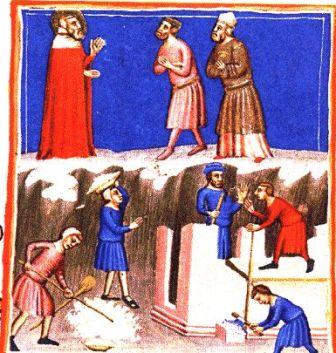
Evensong on the Day of Pentecost 2009
In our first reading we heard how Moses instructs the people of Israel to celebrate the feast of seven weeks, known as the feast Pentecost. The feast was celebrated 50 days after the start of the harvest. The celebration that Moses orders is meant to be regular – celebrated every year, exactly 50 days after the first day of the harvest – presumably until the end of time.
This Jewish feast of Pentecost is picked up by Saint Luke in the Acts of Apostles and attached to the day when Jesus’ followers received the Holy Spirit. Like the Jewish feast that it is rooted in, Pentecost has become a feast celebrated each year, exactly fifty days after Easter Day – it is not so much a feast day rather than a celebration and culmination of the Easter Season.
I know that today is Pentecost, next Sunday is Trinity Sunday, after that Corpus Christi, and beginning this week we begin to settle into Ordinary Time for the Summer and Fall. I can look at a calendar and I know what to expect because I have done it before and I know what its going to be like.
It’s the same every year and I find comfort in such regularity. Somewhat contrary to this type of routine is the second reading. Jesus has told his followers that he is leaving, but he will leave them his Peace and give them the gift of the Holy Spirit. The disciples do not know what will happen next. They have questions and the answers that Jesus gives only begin to make sense after his Resurrection and the pouring out of the Holy Spirit.
I believe that in the midst of the regularity of the church year, as well as in the midst of the daily routine every single one of us cherishes, each of us encounters God working our lives in unexpected and mysterious ways.
A few examples: We scheduled Confirmation with Bishop Grein at this morning’s 11:00 AM Solemn Mass – Here we are tonight at what may be the first and only service of Evensong, Confirmation and Benediction that most – if not all – of us have or ever will attend. Bishop Grein is not here, but thankfully Bishop St John is. This entire evening is an unexpected blessing for all of us.
Two and a half weeks ago my wife and I celebrated the birth of our second child, Nicholas. Whatever daily routine we had developed has been completely shattered – I used to enjoy planning dinner each night of the week, now I am thrilled if the four of us are able to be in the same room together at the same time without someone crying. Life with a newborn and a 2-and-a-half year old who is delighted that he is suddenly a big brother has brought more challenges and blessings than I can count – all of them unexpected, but all of them filled with the mystery and love of God working in our lives. I never imagined that I would hear my older son Liam say: “I’m the one who gets to say: Lord Jesus make Nicholas a good boy.” I never saw that coming.
The most recent example, I can think of comes from a conversation I had this morning at Coffee Hour. At Solemn Mass a young boy was baptized and there were lots of other children present. A little girl who is in church every week named Joanna – no more than four years old – came up and asked me what Baptism was. I was caught off guard, but I gave my best answer. Baptism is when you begin a new life in Christ and when you get baptized you become part of the church. “Why do we get baptized”, she asked. I was basically ready for this after the last question: We get baptized because Jesus himself was Baptized and because he told us to Baptize others. Maybe not the most profound answers, but I thought it was ok for a four year old. Her last question caught me off guard again. “Why water?” I thought of quoting some passage of scripture or church doctrine about dying and rising and being cleansed from sin, but what I said was far less profound: “Its like a bath, you come out new. But you only have to take it once.” It wasn’t a perfect answer, but she got that I think.
When I think about it, every day of my life has served as a reminder that I can plan for what I think might happen next, but I do not know what tomorrow will bring. We don’t need to have answers to every question or a plan for every situation; the apostles didn’t, but every time I confront the unexpected and ask for God’s help I’ve found that the Lord is present in unexpected and mysterious ways.
I believe part of making a Christian adult affirmation of faith in Jesus’ death and resurrection is understanding that you and I will continually be faced with unexpected questions and situations that fall far outside out regular routine. As a Christian who continues to learn, I think the best advice I can give to any other Christian is this: continue to ask for God’s help and guidance and continue to pray for the Holy Spirit to fill you with wisdom, courage, and strength; and continue to spread the Good News of Christ to those around us.
















